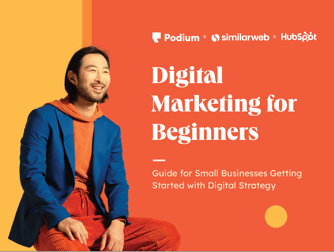-

7 Brands That Got Inclusive Marketing Right
Check out inclusive marketing examples from Google, Netflix, and Amazon, and why they work...
Sonia Thompson
3/7/25
-

How to Create an Anchor Link to Jump to a Specific Part of a Page
Anchor links are the secret to a smooth, scannable web experience — here’s how you can cre...
Ginny Mineo
3/7/25
-

The Usability Testing Playbook [Expert Tips & Sample Questions]
Think your product is intuitive? Usability testing might prove you wrong — here’s how to d...
Clifford Chi
3/6/25
-

How to Develop a Content Strategy in 7 Steps (From Start to Finish)
Want your content to attract and engage your target audience at every stage of the funnel?...
Caroline Forsey
3/6/25
From HubSpot's video library
-
.jpg?height=240&name=YT-237_A%20(1).jpg)
How to Start Affiliate Marketing With No Experience or Money (4 Free Tools!)
-

How Airlines Really Make Money | Hustlenomics | The Hustle
-
.jpg?height=240&name=IMG_0735%20(1).jpg)
What Entrepreneurs Can Learn From Native Deodorant
-

Meet the Designer Behind the Iconic Nudie Suit | Unknown Empires
-

Tips For Elevating Your Next Go-To-Market Strategy (+ Free Templates)
-

Why T-Mobile Trademarked This Color | The Hustle
-
.jpg?height=240&name=YT-237_A%20(1).jpg)
How to Start Affiliate Marketing With No Experience or Money (4 Free Tools!)
-

How Airlines Really Make Money | Hustlenomics | The Hustle
-
.jpg?height=240&name=IMG_0735%20(1).jpg)
What Entrepreneurs Can Learn From Native Deodorant
-

Meet the Designer Behind the Iconic Nudie Suit | Unknown Empires
-

Tips For Elevating Your Next Go-To-Market Strategy (+ Free Templates)
-

Why T-Mobile Trademarked This Color | The Hustle
-
.jpg?height=240&name=YT-237_A%20(1).jpg)
How to Start Affiliate Marketing With No Experience or Money (4 Free Tools!)
-

How Airlines Really Make Money | Hustlenomics | The Hustle
-
.jpg?height=240&name=IMG_0735%20(1).jpg)
What Entrepreneurs Can Learn From Native Deodorant
-

Meet the Designer Behind the Iconic Nudie Suit | Unknown Empires
-

Tips For Elevating Your Next Go-To-Market Strategy (+ Free Templates)
-

Why T-Mobile Trademarked This Color | The Hustle
-

AI Intent — Figuring Out the Purpose that Drives Service Tech
AI intent is an AI system’s ability to understand the meaning behind a user’s input. Disco...
Kolawole Samuel Adebayo
2/21/25
-

Level Up Your POS Experience — Here's What Experts Have to Say
The POS experience is an important transactional moment for your customers. Here's why — a...
Nakul Kadaba
2/21/25
-

Training AI Chatbots — The Guide for Service Teams
Uncover the insights that will help you train AI chatbots effectively, ensuring they deliv...
Kolawole Samuel Adebayo
2/19/25
-

Top 12 Free Help Desk Software & Ticketing Systems in 2025
If you're ready to take customer experience to the next level, you'll need help desk and t...
Rami El-Abidin
2/18/25

An Introduction to Digital Marketing
Learn the basics of digital marketing and explore different ways to reach your ideal customer.
-

Entrepreneurial Marketing: Find New Customers on a Shoestring Budget [+Expert Ti...
Learn how to implement entrepreneurial marketing — a unique approach for startups and smal...
Mandy Bray
3/7/25
-

If You Want to Become a Sales Rep, Here’s Everything You Need to Know to Get Sta...
Great sales reps aren't born, they're made. Learn how to be a good sales rep and a crucial...
Justina Thompson
3/7/25
-

Entrepreneurship Trends That Will Change the Business of Building Businesses in ...
Discover the top entrepreneurship trends shaping the future of business in 2025. See what ...
Rachel Nicholson
3/7/25
-

15 Brand Positioning Examples to Refine Your Branding Strategy
Discover how iconic brands like Tesla, Patagonia, and Airbnb create unforgettable position...
Sujan Patel
3/7/25
From the HubSpot Podcast Network
-
Business Made Simple

Your Website Probably Stinks—Here’s How to Fix It!
-
The Science of Scaling

How to Scale a Billion Dollar Sales Team w/ John McMahon (Board Member, Snowflake)
-
Truth, Lies and Workplace Culture
-2.png?height=240&name=PodcastCovers23%20(1)-2.png)
From Bystander to Ally: How to Avoid DEIB Washing
-
Imperfect Action
-2.png?height=240&name=PodcastCovers23%20(4)-2.png)
The art of the post-launch review: 5 questions to make your next launch a success
-
Latinx In Power
.png?height=240&name=PodcastCovers23%20(6).png)
Harnessing the Power of Silence in Negotiation with Diana Kleps
-
The Sales Evangelist

5 Ways To Do Daily Outbound With LinkedIn
-
Business Made Simple

Your Website Probably Stinks—Here’s How to Fix It!
-
The Science of Scaling

How to Scale a Billion Dollar Sales Team w/ John McMahon (Board Member, Snowflake)
-
Truth, Lies and Workplace Culture
-2.png?height=240&name=PodcastCovers23%20(1)-2.png)
From Bystander to Ally: How to Avoid DEIB Washing
-
Imperfect Action
-2.png?height=240&name=PodcastCovers23%20(4)-2.png)
The art of the post-launch review: 5 questions to make your next launch a success
-
Latinx In Power
.png?height=240&name=PodcastCovers23%20(6).png)
Harnessing the Power of Silence in Negotiation with Diana Kleps
-
The Sales Evangelist

5 Ways To Do Daily Outbound With LinkedIn
-
Business Made Simple

Your Website Probably Stinks—Here’s How to Fix It!
-
The Science of Scaling

How to Scale a Billion Dollar Sales Team w/ John McMahon (Board Member, Snowflake)
-
Truth, Lies and Workplace Culture
-2.png?height=240&name=PodcastCovers23%20(1)-2.png)
From Bystander to Ally: How to Avoid DEIB Washing
-
Imperfect Action
-2.png?height=240&name=PodcastCovers23%20(4)-2.png)
The art of the post-launch review: 5 questions to make your next launch a success
-
Latinx In Power
.png?height=240&name=PodcastCovers23%20(6).png)
Harnessing the Power of Silence in Negotiation with Diana Kleps
-
The Sales Evangelist

5 Ways To Do Daily Outbound With LinkedIn
-

How to Build a Website From Scratch If You're Not a Developer
Learn how to build a website from scratch without using code in this step-by-step guide. I...
Lauren Farrell
3/6/25
-

Here’s How I Measure Website Speed and Guarantee Performance (+Tips)
Learn about the importance of website speed and which page speed test options will help yo...
Anna Fitzgerald
3/6/25
-

Website Design Proposal: 8 Items to Include [+Template]
Learn how to craft a website design proposal that wins over clients. Get plenty of example...
Jenny Romanchuk
3/4/25
-

Page Layout Design Explained [+20 Website Layout Ideas]
Learn the basics of page layout design and get some ideas to inspire your own website layo...
Kayla Schilthuis-Ihrig
3/3/25
-

Website Development: The Complete Beginner's Guide
Read about the basics of web development, the process of creating a website, and additiona...
Allie Decker
3/3/25
-

The Podcaster's Guide to Embedding Your Show on Your Website [+Step-by-Step Tuto...
Learn how to effectively embed podcast episodes from platforms like Spotify and Apple on y...
Darrielle Evans
2/27/25
Explore more topics
Ready to brush up on something new? We've got more to read right this way.






.png)
